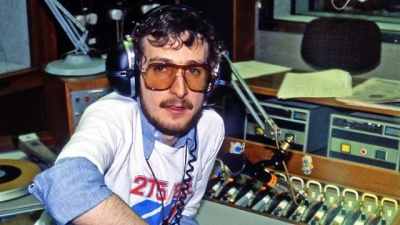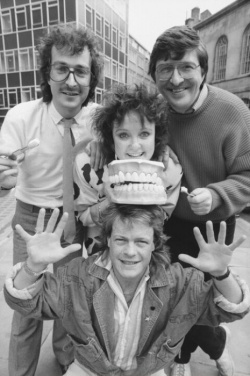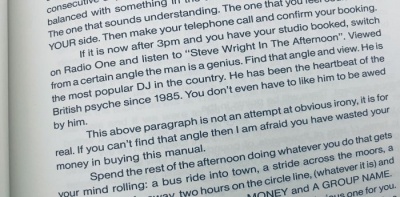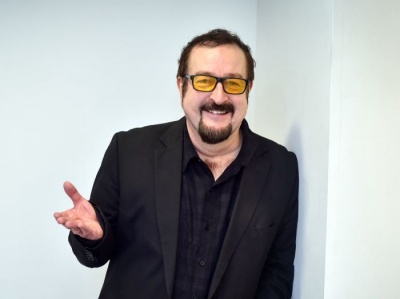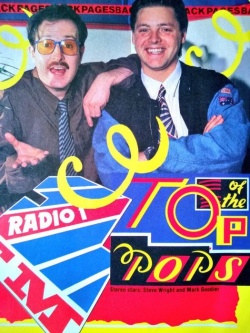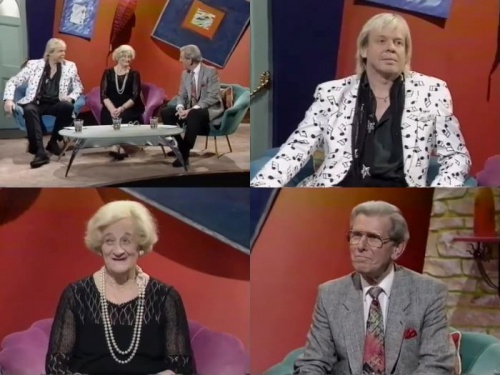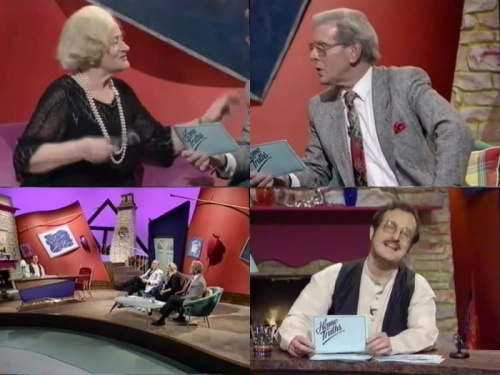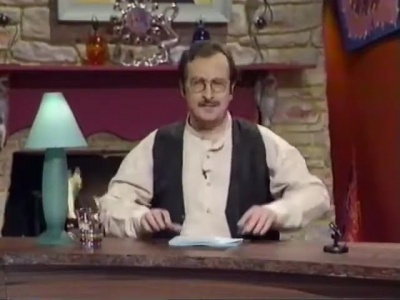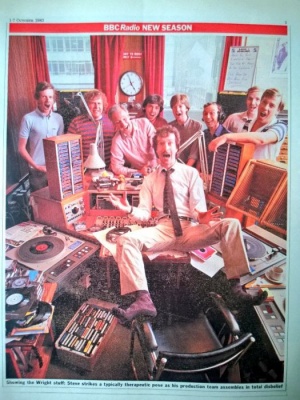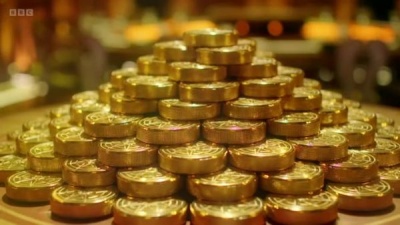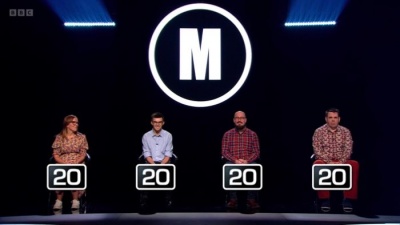Weaver's Week 2024-02-25
(Created page with 'Last week | Weaver's Week Index | Next week Loved the show, Steve == Steve Wright == === 1954-20…')
Newer edit →
Revision as of 11:40, 25 February 2024
Last week | Weaver's Week Index | Next week
Loved the show, Steve
Contents |
Steve Wright
1954-2024
Steve Wright lived on radio, and loved radio. He briefly flirted with respectable jobs – telephone engineer, insurance agent – then worked at the BBC Gramophone Library, picking the fluff out of Mantovani discs lest they click when Jimmy Young played them. He got into radio journalism at LBC in London, then went behind the microphone at Radio 210 in Reading, accompanying Mike Read on The Read and Wright Show. A spell at Radio Luxembourg followed, and he joined Radio 1 in 1980.
Steve's first slot was the "experimental" Saturday evening show, after they'd ceded the VHF transmitters to Radio 2 and only went out in squeaky old medium wave to an audience of about ten people. The slot was used to test presenters – Mark Goodier and Simon Mayo would go on to make careers from it, Graham Bannerman didn't. Steve Wright was clearly destined for bigger and better things, especially when budget cuts meant the Saturday evening show was abolished.
Steve took over the afternoon show, and made it his own. Steve Wright in the Afternoon ran from 1981 to 1993, full of showbiz gossip and silly characters and heavily produced segments. Steve pioneered the "zoo" format, with lots of people chipping in, and with actors playing roles like "Mr. Angry" and "Mr. Food" and "Barry from Watford".
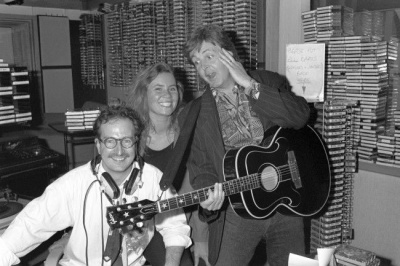 Paul McCartney put his new album somewhere in Steve's pile of carts; it'll take Dianne Oxberry to find it again.
Paul McCartney put his new album somewhere in Steve's pile of carts; it'll take Dianne Oxberry to find it again.
For this column, it was a show we would listen to but never love: to a casual listener, the wackiness felt forced, the recurring characters were alien, the tonal shift from great music to banal chatter left us reeling. There were usually more interesting options elsewhere on the dial, Peter Craig or Tony Paul on our local station Beacon, or we could watch Countdown or Fifteen-to-One.
But we admired Steve's professionalism and commitment, we could hear that he was putting in more effort than some DJs we could name, and when the mood struck us – when we were stuck in traffic, or needed sheer entertainment – Steve was there. And, by only tuning in occasionally, we missed part of the point – with catchphrases like "touch the radio and feel the warmth of my sincerity", Steve was taking the mickey out of other DJs, showing himself up to be laughed at.
Steve was briefly there on Sunday mornings in the mid-80s, but the afternoons were his natural home. Steve would occasionally go on holiday to New York, stay in his hotel room, and listen to the radio. What could he learn from Z-100, WPLJ, The Fan, or Hot 97? And how could he make his show sound as awesome as that? Steve worked all hours of the day, he'd be in at 9am for a 3pm start, and might stay in the studio to do some "bits" for later. Steve also ensured his "afternoon posse" were properly paid for the work they did, topping up the BBC stipend to as much as he felt they were due.
Constantly reinventing himself, Steve Wright was cited by anarcho-pop-pranksters The KLF as a genius.
- If it is now after 3pm and you have your studio booked, switch on Radio One and listen to Steve Wright In The Afternoon. Viewed from a certain angle the man is a genius. Find that angle and view. He is the most popular DJ in the country. He has been the heartbeat of the British psyche since 1985. You don’t even have to like him to be awed by him. This above paragraph is not an attempt at obvious irony, it is for real. If you can’t find that angle then I am afraid you have wasted your money in buying this manual.
Steve Wright in the Afternoon adapted to the demands of Bannisterisation, as Radio 1 shed its all-ages policy and focussed on a twentysomething audience. Such was Steve's power that he went to the breakfast show in 1994 – but that didn't work, Steve's show required lots of prep, and it turned out they couldn't prepare the show the day before. The breakfast show didn't sound right, Steve knew it, and the listeners knew it. Steve left Radio 1 Breakfast after 15 months, succeeded by the fresh-faced Chris Evans. Steve had a brief engagement at Talk Radio, and did a love songs show on GWR. But the commercial stations wanted tight controls over what he played, and got awkward when he rearranged the studio in the way he liked.
Steve returned to the BBC in 1996, now on Radio 2. He started with a Sunday love songs programme, and soon added a Saturday morning show. The afternoon show, now calling itself The Big Show, returned in 1999, and ran until 2022. The programme evolved a little – "non-stop oldies", dance music of "serious jockin'", factoids and celebrity interviews – but always revolved around Steve and "the posse". Being in an office until 5pm we rarely caught the show. It made particularly comfortable listening during the 2020 health crisis, when Steve was as confused as we were but wasn't going to let that stop him doing what he did.
Steve was "invited" to leave Radio 2's afternoon programme in 2022, kept on the love songs show, and added Pick of the Pops last October. He was so much more suited than the last host, bringing stories and memories and a touch of humanity to the oldies show.
Steve was a regular host on Top of the Pops during the 1980s, running the gamut from The Specials to Jive Bunny, from Madonna to "Nellie the elephant"; he'd later do the narration for archive clips show TOTP2. Although he was personable and great when booked for panel shows, hosting television shows wasn't his forte; The Steve Wright People Show didn't stimulate him, and Auntie's TV Favourites was the sort of thing anyone could host.
For a giant of broadcasting, Steve hosted just three game shows. Steve Wright's Quiz of the Year was a one-shot review of 2022, playing the year's hits and talking to comedians, with a quiz providing some sort of framework for the discussion.
The Big Quiz was a regular feature on Radio 2's The Big Show: 90 seconds of questions for each player, but the first error after 60 seconds will end the round. Higher score of the two players wins the day and comes back tomorrow for an even bigger prize. The quiz was light-hearted, questions were on showbiz and pop music, and perhaps the biggest prize was to talk to Steve and the posse. The Big Quiz was taken off during the 0898-gate scandals in 2007, and never returned – having run for eight years, it was perhaps time for the show to move on.
Home Truths (1)
BBC1, 21 January – 25 March 1994
Steve did accept one primetime television show. Home Truths – no relation to the John Peel programme on Radio 4 – was presented from a sitting room, complete with "roaring" fireplace, comfortable armchairs, vivid colours on the walls, and paintings at a "jaunty" angle. The guests on our sample edition are Rick Wakeman (keyboardist), Liz Smith (actress), and Bob Holness (Blockbusters).
Home Truths begins with a short film about each of our celebs. It's the story of their life condensed into 90 seconds, with Steve giving a wry speech and including five facts. Except! Two of the "facts" are complete cobblers, bunkum they made up down the pub at lunchtime and put into the script. Can the other panellists identify these falsehoods, and score points?
Let's be frank, did Bob Holness really have to shave his eyebrows to look less menacing? Did he write a top ten hit for Toto Cuelo? And was Blockbusters so popular in Dubai that Bob flew over at the end of Eid to host the schools' championship? Yes, they literally had to prune down Bob's eyebrows, and sew them down to make himself look less ferocious and threatening on Take a Letter. Yes, Bob made personal appearances in Dubai where they know a good show when they see it. But no, Toto Cuelo's hit wasn't written by Bob, and he didn't play saxophone on it, though the group did feature his daughter.
It can quickly be seen that Steve "controls" this show in the same way Nicholas Parsons "controls" Just a Minute – he sits in the corner and lets the others get on with it. Liz gives away the right answers to her questions, and Bob ends up holding one of Steve's question cards to help Liz get the answers.
Round two consists of more clips for the panel, which allows them to share further memories about their career. Does Bob remember the name on the bottle of Vosene shampoo, the one he advertised 31 years ago? "Biomin", which we thought was the living creator of "Robominx".
The show concludes with a specialist subject round, one minute of quick-fire questions on a topic they've told themselves. Rick picks the Just William books, Liz goes for the painter Van Gogh, and Bob answers on swing bands of the 1940s and 50s.
It is a contest, they do keep score, with one point per correct answer and some bonus marks handed out at the chairman's discretion. Thanks to superb knowledge of swing music, Bob Holness wins, and justice is served.
Shown at 7pm on Friday night, this was a gentle and fluffy way to start the weekend. We learn a little about the celebs, and have some fun. Although there's not much when written down, Home Truths is a perfectly watchable show, and they could re-make it for any awkward half-hour slot today. It's just that anyone could be behind the desk, and we get the impression Steve Wright only hosted to raise his profile for his Radio 1 show.
Steve Wright was at home in the radio studio. He'd come in, with dozens and dozens of "carts" – little bits of tape that would play for ten, twenty seconds. He'd put them in the machine, play them, then snatch it out to move on to the next item. A blur of motion, always knew exactly where he was, always knew exactly where he wanted to be. Steve was like the greatest classical conductors at work.
We can only admire the sheer artistry and inventiveness Steve brought across three decades. And the dedication, his life's work was to entertain people, to make folks' lives that little bit better. And that's a fine epitaph to leave.
In other news
Where is Spain? We've got about eight months to work it out, because Junior Eurovision Song Contest is going to the runner-up broadcaster. TVE finished second in Nice last year, but with France Télévisions busy with other stuff this year, and having done JESC twice this decade, they've passed on holding the contest. The host city and date will be confirmed in due course, and we'll make a note of Trains to Spain.
What Is This Guff? Alan Carr's Picture Slam has been renewed for a second series, even longer than the first. Ten episodes will clog up Saturday nights later in the year. According to the BBC, the series attracted an average of 3.3 million viewers, and was the second most successful entertainment launch of the year. We don't recognise the rating figure, and we're not sure what the most successful entertainment launch was meant to be, seeing how The 1% Club was 2022.
Who Owns The Traitors? RedBird IMI will buy All3Media from its joint owners, Warner Brothers Discovery and Liberty Global. The price is apparently £1150mn (€1350mn). RedBird IMI is itself a joint venture between RedBird Capital Partners based in New York; and International Media Investments, the investment vehicle for the UAE vice-president.
All3Media is based in London, and has 50 production labels including Studio Lambert (The Traitors), Objective Media Group (Lingo), Lion Television (Homes Under the Hammer, Horrible Histories), Lime Pictures (Hollyoaks), Optomen (Great Local Menu), and Neal Street Productions (Call the Midwife). Although All3Media seems to make about a third of everything on television, it's still classed as an "independent" as it doesn't own a television channel.
Your move, Eurovision Much was made of the NFL's boast to have reached 202.4 million viewers for the Off-White Cup a couple of weeks ago, where the Kansas City Swifts beat the San Francisco Gnats by a powerplay free throw deep into injury time. (Or something: the details baffle us.) "That's the most people to have seen a few seconds of a broadcast in the history of television ever!" trumpeted broadcaster CBS.
Hasn't Eurovision had a bigger audience? Yes. The highest total asserted by the EBU is 204 million who saw some of the contest in 2016 – and that's only amongst the participating broadcasters.
The Superbowl wasn't the largest television audience of the weekend. Chunwan Show, the Chinese new year gala, is shown on every channel at the same time. Accurate viewing figures for Communist China take some time to emerge, but the 2018 edition had over 620 million viewers on television. That's three Superbowls plus everyone who claims to have been in the stadium.
The Superbowl might not even be largest sports television audience of the weekend. The Africa Cup of Nations finished in Côte d'Ivoire (it's their version of Mark Pougatch's World Cup of Football). Organisers AFCON claim 2000 million viewers across the tournament, which we assume will be the total number of people who saw a few seconds of any match, multiplied by the number of matches they saw. Accurate viewing figures for the grand final will take time to compile, and may exceed the figure claimed by the NFL. Or may not: the 2019 final "only" attracted 90 million people.
Quizzy Mondays
Mastermind wrapped up its heats with perfectly clear vision: a scores of 20, 20, 20, and 20. Two of the contestants who scored 20 had one pass, the other two had no passes, and those two went into a tie-break. Richard Brooks scored two to top the tie-break, having taken Winnie-the-Pooh and AA Milne as a specialist subject.
Richard returned in this week's semi-final, and again decided not to pass. It gave him an advantage over Jane Hill, who popped a pass in and got an extra general knowledge question, only to confuse the National Portrait Gallery with the neighbouring National Landscape Gallery. Sarah Thornton won the show, she took the crime drama Happy Valley, was perfect on the crime drama Happy Valley, and won with a score of 26. "Crikey, thank you!" her response.
University Challenge has resolved the top half of its over-complex quarter-final draw. Imperial beat Manchester to book their place in the semi-finals, pulling away in the second half of the match with four consecutive starters stretching the lead by 85 points. Manchester again showed themselves wobbly on the bonuses.
Birkbeck won the elimination match, putting Sheffield out at this early stage. The London side won the first and last phases of the match, but sagged quite remarkably in the middle, allowing Sheffield to briefly take the lead. Any side that can deal equally well with cell biology, the life of Fela Kuti, and the locations of speedway teams – they deserve their place in an elimination match against next week's losers.
We also saw the Only Connect Championship of Champions from 2009. A couple of very thin connections – these days we might see "words of Indian derivation" as a group on a wall around the win-loss phase; for the opening round, the Connections round would probably be definitions of words like "bungalow" and "gymkhana". The picture research is so much better these days: if the contestants are meant to see "1 TON" on a weight, they'll pick it out in bright writing.
Really loved the camera angles of the teams crowding in as they conferred on the walls; less impressed by Missing Vowel questions like the verse form "HK". In the fifteen years since this show was filmed, all of the Crossworders have won Brain of Britain, and Brain of Brains. Mark Labbett has done well for himself, too.
We had rather hoped to review CBBC's recent Style It Out, but a nasty cold has laid us low for much of the week. A review will follow in due course.
Good stuff on BBC Scotland, where Scotland's Greatest Escape (Wed) and Eat the Town (Thu) are back. So is House of the Year on RTÉ1. Out of Order (2) has Rosie Jones putting people in the right line-up (Comedy Central, Mon).
Elsewhere, Landscape Artist of the Year is named (Artsworld, Wed). The longest-running song competition on the islands, Can i Gymru, marks its 50th consecutive year (S4C, Fri), and we hear the BBC's Eurosong (Fri). Rob Beckett's Smart TV is new on KYTV, at the oh-so-accessible time of 2am on Thursday. Dermot O'Leary makes his annual appearance on The Wheel (BBC1, Sat), and Saturday Night Takeaway (ITV) talk to Olivia Colman and Jessie Buckley – will they do better than on Ten to the Top this week?
Pictures: BBC, KLF Communications, EBU / France Télévisions, Studio Lambert Scotland, Hindsight / Hat Trick.
To have Weaver's Week emailed to you on publication day, receive our exclusive TV roundup of the game shows in the week ahead, and chat to other ukgameshows.com readers, sign up to our Google Group.
Last week | Weaver's Week Index | Next week

